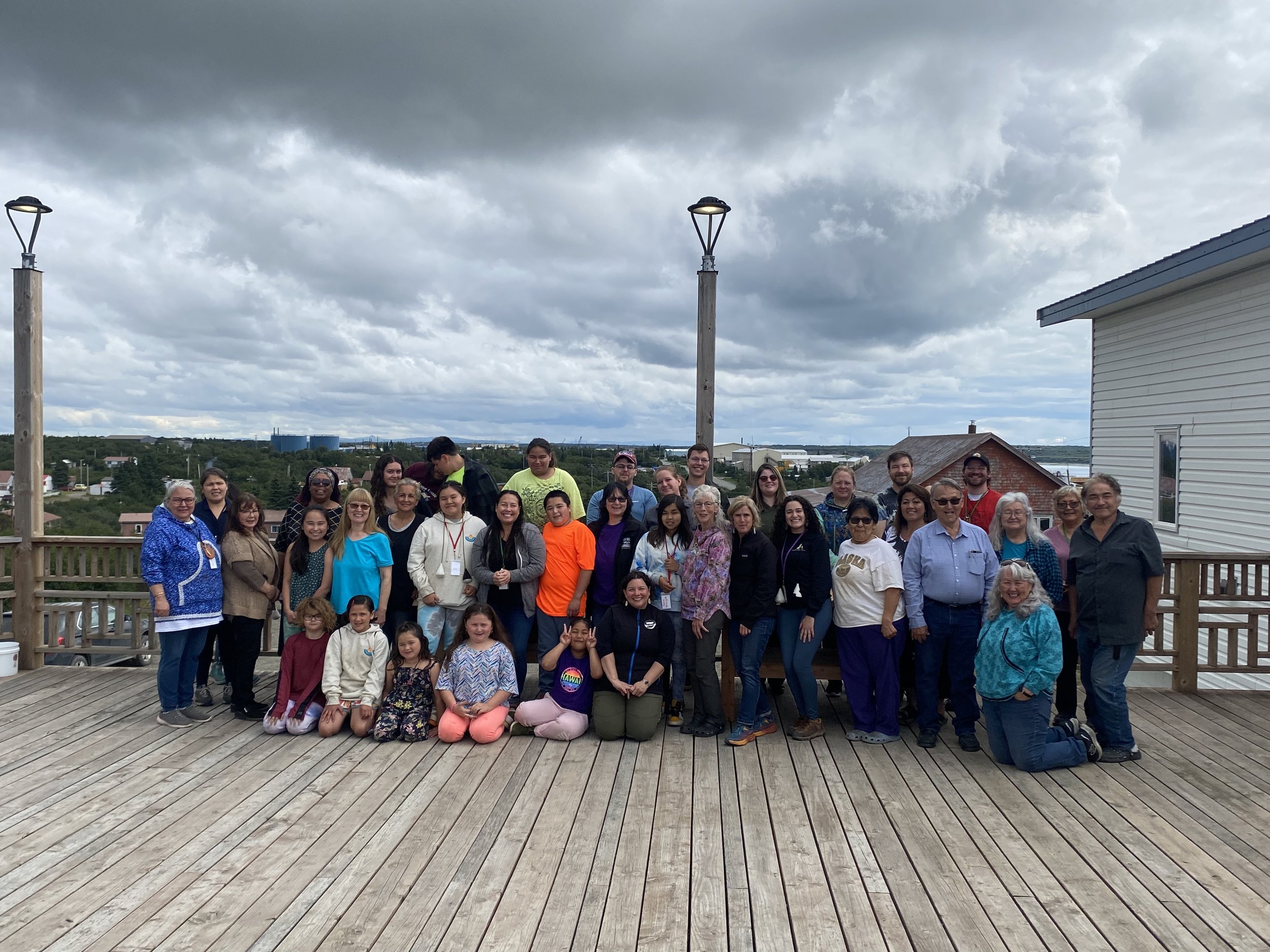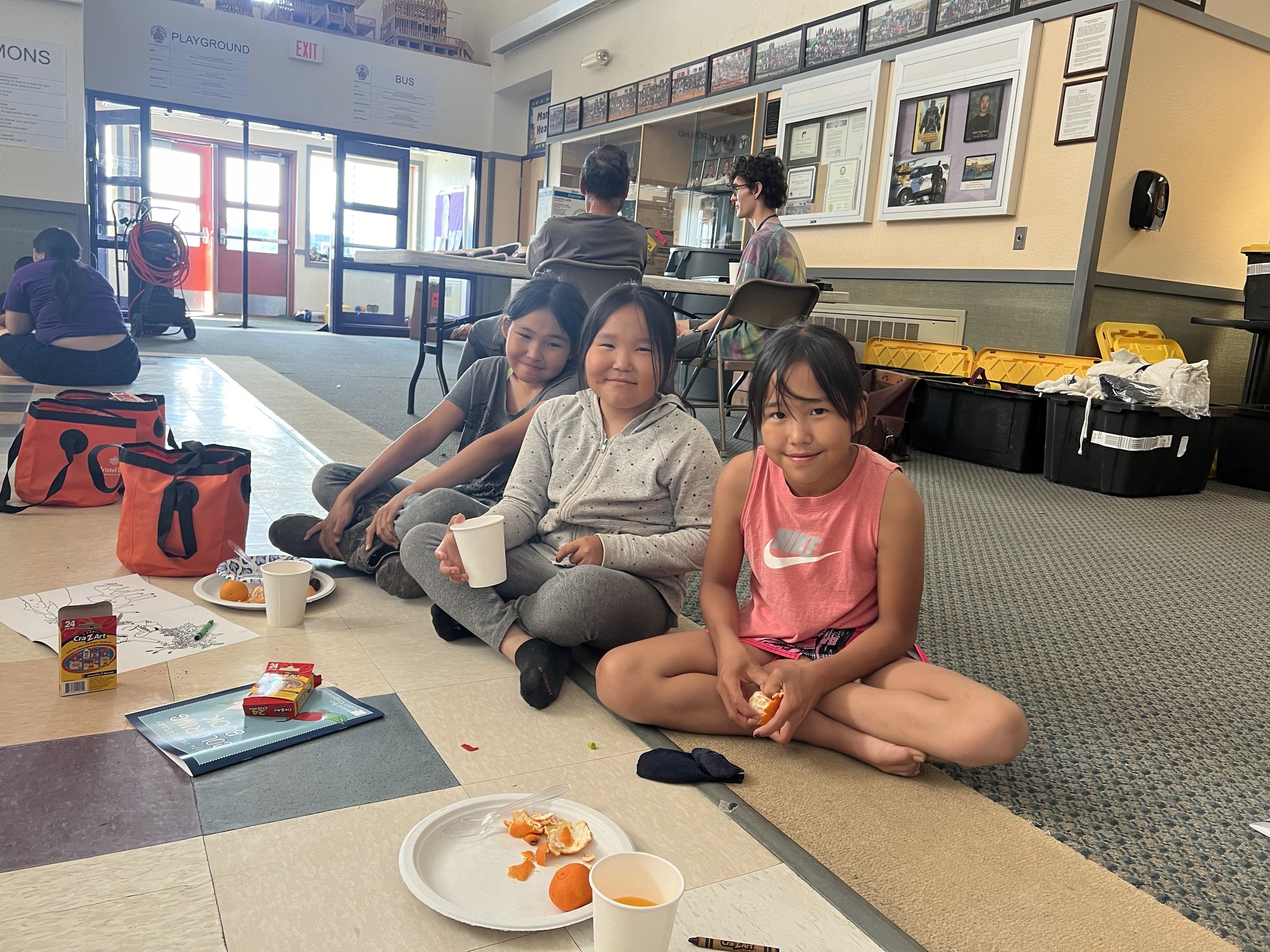
C U L T U R A L P R O G R A M S
Bristol Bay Teaching & Learning Collaborative
Improving Teaching Quality in our Indigenous Communities to Increase Student Success.

The Partners
The Collaborative is a partnership between BBF, BBNC, the Alaska Humanities Forum (AKHF), the University of Alaska Anchorage School of Education (UAA), Bristol Bay Region Career and Technical Education program (BBRCTE), and the region’s four school districts: Bristol Bay Borough, Dillingham City, Lake and Peninsula, and Southwest Region School Districts.
“Trust is at the center of education.”
Participant comment, Oct. 2021 regional visioning session
The Collaborative
The goal of The Collaborative is to increase student success in Bristol Bay by increasing the quality of the teachers in four ways:
01.
Firstly, the project will implement AKHF's Creating Cultural Competence (C3) model to enhance the cultural competence of educators in the region's four school districts, which is expected to result more culturally inclusive classroom practices. The program will give teachers the opportunity to experience the local culture first hand through mentorship, coursework, and participation in local culture camps that provide deeper insights into their communities, students, as well as their own cultures and biases.
02.
Secondly, the project will establish BBF's Community Cultural Resource Repository and a first-in-the-region community based culture camp model that can travel to different communities each summer to strengthen the cultural education infrastructure in the region and document cultural resources. The repository will include over 60 new cultural activity plans and identify language speakers, teachers, and translators for Yup'ik, Dena'ina, Alutiiq languages, and local dialects.
03.
Thirdly, the project aims to increase the number of Indigenous educators in the region by providing targeted support for high school students and paraprofessionals and conducting two detailed needs assessments to identify the barriers faced by individuals from those communities in becoming certified teachers. These assessments will lay the groundwork for future programming that is informed and intentional.
04.
Finally, the project will foster stronger school-community connections through shared experiences at culture camps, which are hosted by communities for their youth to learn traditional skills from Elders and knowledge bearers in traditional ways. This experience will provide a shared context for teachers, communities, and students to build upon throughout the school year, and it will push back against the status quo of schools in rural Alaska being "sites of separation" where mostly white teachers work in isolation from the community (Jester & Fickel, 2013).
Teaching, Community and Student Opportunities
Building Local Educators!
Are you from Bristol Bay and are interested in becoming an educator in one of our Bristol Bay schools?
The Bristol Bay Regional Career & Technical Education Consortium is working to increase the number of local Indigenous educators through a new approach to teacher education. The Bristol Bay region, much like other areas of the state, is facing a crisis in staffing our schools. In doing so, it help our schools and early childhood facilities decrease turnover and become more connected to community. This pathway will allow high school students, current paraprofessionals, and community members to learn and grow as educators, without the need to leave home for long periods of time. Studies indicate that Indigenous teachers can have the following positive impacts on Indigenous students:
Learning is enhanced when teacher and student share the same language and culture;
Indigenous teachers enhance the teacher-student relationship for Indigenous youth and increase the desire of students to stay in school;
Indigenous teachers provide connectivity to Indigenous students’ lives; and
Indigenous teachers are likely to be aware of Indigenous learning styles and utilize this information to improve teaching styles.
If you have any questions, please contact Steve Noonkesser or visit https://bbrcte.org/ to learn more.
Empowering Community-Based Culture Camps!
Over three years the Bristol Bay Foundation will partner with seven communities to host community-based culture camps over the life of the Alaska Native Education Program Grant. The Foundation will work with the local tribes, schools, local knowledge bearers and cultural educators to offer this opportunity that will bring our Elders, adults, and students together to learn about our Bristol Bay Cultures through hands-on activities. This model means that communities will now have access to a camp that includes staff, equipment, supplies and curriculum - all provided free of charge to the community through The Collaborative.
Program Learning Outcomes:
Culture Camp participants increase their knowledge & skillsets around their culture.
Culture Camp participants have a stronger sense of self and cultural identify.
Culture Camp participants gain a deeper understanding of the local and regional cultures of Bristol Bay.
If you have any questions, please contact Helen John or Megan Donhauser.
BBNC Culture Camp
The BBNC Culture Camp is an opportunity for BBNC shareholders and descendants who will be in grades 9-12 next school year to share and be exposed to the cultures, languages, and traditions of the Bristol Bay region. Culture Camp is a time to come together to share and learn our ways of knowing, doing, and being as descendants of Bristol Bay’s three cultural groups: Alutiiq/Sugpiaq, Dena’ina, and Yup’ik. Participants will experience camping and living from the land through a variety of activities from local knowledge bearers from across the region. In addition, participants will be exposed to traditional crafts, language learning, and song and dance.
BBNC shareholders and descendants who will be in grades 9-12 next school year. Applications will be evaluated on the student’s application, teacher/community reference, the applicants age, and ensuring equal representation for geographic regions and cultural groups.
If you have any questions, please contact BBNC at rsedor@bbnc.net or 1-800-426-3602.
C3 Opportunity for Bristol Bay Teachers!
Know a teacher in the Bristol Bay region of Alaska? Are you a teacher interested in deepening your skill sets?
Alaska Humanities Forum, in partnership with Bristol Bay Foundation, is accepting applications for the Creating Cultural Competence (C3) program for next school year! C3 educators participate in culturally immersive and affirming experiences designed to help them connect more deeply to the community they live in and the students they serve and to gain a better understanding of who they are and how they relate to the world around them.
Through the C3 program, teachers build relationships that help them connect with the people, communities, and places where they will be teaching. Benefits are:
Earn graduate credit: Free enrollment for teacher participants in multicultural studies course required for Alaska certification or renewal credits.
All expenses paid: Airfare to Bristol Bay community, program materials, and course credit are covered by the program.
Experiential Learning: Cultural immersion experience with local Elders, youth, and community members.
Interested in learning more?
If you have any questions, please contact Julie at jrowland@akhf.org or visit akhf.org/c3 to learn more.
Master of Education Opportunity for Bristol Bay Teachers!
Know a teacher in the Bristol Bay region of Alaska? Are you a teacher interested in deepening your skill sets?
The Master of Education in Teaching and Learning is designed for professionals seeking advanced studies in education. The program supports development of scholarly practitioners through coursework and a comprehensive portfolio, which includes an applied research project. Culturally responsive education and application of that approach in the Alaskan context is emphasized, particularly with respect to Alaska Native education and cultural and linguistic diversity. Programs will be planned with an advisor to allow concentrations in areas relevant to P-12 schools or other professional settings.
Program Learning Outcomes:
Students graduating with an M.Ed. in Teaching and Learning will be able to:
Demonstrate advanced content and pedagogical knowledge for teaching.
Use research to inform professional practice.
Explain the relationship between social justice and education.
Demonstrate leadership skills for the professional context.
Translate educational theories into culturally responsive practice.
Interested in learning more?
If you have any questions, please contact Tim Jester, Ed. D. at tejester@alaska.edu.






